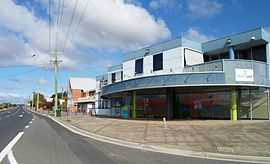Riverside, Tasmania
| Riverside Launceston, Tasmania | |||||||||||||
|---|---|---|---|---|---|---|---|---|---|---|---|---|---|
 Commercial buildings and St David's Church on the corner of Ecclestone Road, Riverside | |||||||||||||
| Population | 6,072 (2011 Census)[1] | ||||||||||||
| Postcode(s) | 7250 | ||||||||||||
| Location | 4 km (2 mi) from Launceston, Tasmania | ||||||||||||
| LGA(s) | West Tamar Council | ||||||||||||
| State electorate(s) | Bass | ||||||||||||
| Federal Division(s) | Bass | ||||||||||||
| |||||||||||||
Riverside is a residential suburb 4 kilometres north-west of the central business district of Launceston, Tasmania's second largest city. The West Tamar Highway runs through the suburb, adjoining Riverside to the West Tamar, which includes small towns: Beaconsfield, George Town and Beauty Point. Riverside is part of the West Tamar Council local government area, despite its close proximity to the Launceston CBD. The suburb is now Launceston's largest by population, narrowly ahead of Kings Meadows, nevertheless, it lacks in shopping facilities, with only a small $2 million centre which opened in the 1980s. The Riverside Shopping Centre as it is known, includes: a Woolworths supermarket, a Banjos bakery and a pharmacist.[2]

Though mostly built in the 1960s, Riverside contains a wide range of buildings, with older brick and weatherboard style homes prominent along the West Tamar Highway and area's closer to the city, many of which being either Edwardian or Art Deco in style, while more modern homes are located in the western and northern areas. Few buildings in Riverside date from the 1800s, though the notable exception being Cormiston House, a former estate house from the mid-1800s, located on a large property at the northern extremity of Riverside.
The western half of Riverside, accessed by Pomona Road, was built in the 1950s as the hydro-electric village of Marrawaylee to serve the construction of the Trevallyn Power Station. Now known as West Riverside, this minor suburb contains a single shop, the St Francis Church as well as the old hydro lodge, now modified into a private residence. The northwestern region of West Riverside has recently been the site of Riverside's most rapid urban growth, with new suburbs now connected onto Pomona Road North, Guildford Road, Tamar Rise and Balmoral Avenue.
References
- ↑ Australian Bureau of Statistics (31 October 2012). "Riverside (State Suburb)". 2011 Census QuickStats. Retrieved 2012-01-12.
- ↑ "Riverside Shopping Centre, Riverside, TAS". Macquarie. Retrieved 2009-02-25.
| ||||||||||||||